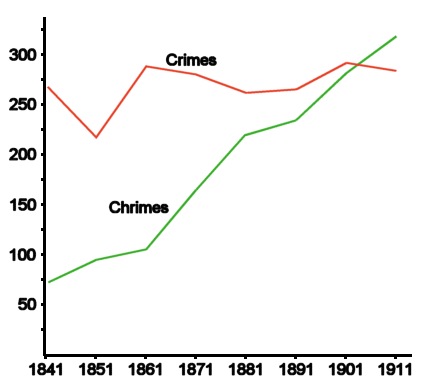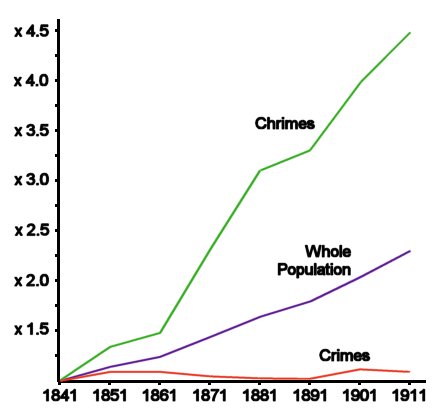
The story of the
Chrimes, Crimes, Chrymes and Crymes
surnames

The story of the
Chrimes, Crimes, Chrymes and Crymes
surnames
Origins
Where and when did the names CHRIMES, CRIMES, CHRYMES and CRYMES originate?Anyone hoping for a concise indisputable answer to this question will be disappointed. That's not to say that the hunt for the name's origins isn't interesting - you may be surprised by some of the findings - but it certainly is not an easy name to research.
Let's start by looking at what previous researchers have found. The following article from the magazine Cheshire Life is a very good place to start.
From Cheshire Life magazine November 1984
IS YOUR NAME CRIMES (OR CHRIMES)?
Most of us, if not all, have criminals among our ancestors; but I've often wondered
what sins had so stamped themselves into this family's origins that their sons and
sons' sons have ever since lived with them. I turned for the answers to the expert
on the family, Philip Crimes, of 12, Spencer Gardens, East Sheen, London SW14 7AH,
and his reply shows that we should never take surname meanings for granted.
It comes from a medieval word crymbe, meaning any small item, but particularly
referring to a field. The word occurred in one or two places in Cheshire as part of
field names; but as the earliest known example of its use as a surname was at Thelwall
court in 1516 when Thomas Crymes was fined 6d for a false accusation of debt, it
seems probable that the family originated in Norton nearby where there was the
chanoncrymbe (the canon's bit of land) as early as 1353. This later appears to be
in the possession of Norton Priory with an area of six acres.
Despite this type of origin, (being like Wood, Marsh, or indeed Field) the surname
seems to have started only in Cheshire, and the family remained very localised in a
triangle through Northwich, Tarvin and Frodsham in the sixteenth century, with a
very high concentration in Weaverham. A few, however, escaped to London, John Crymes
being a member of the Clothworkers' Company early in the same century, and Richard,
a haberdasher, whose will of 1565 can be read in that marvelous, but now alas
defunct journal, the Cheshire Sheaf (3rd series, vol. 13); the will shows
that he was from Northwich. It was then quite common for young men to make their
fortunes in London, and then to remember the inadequacies of their birthplace when
they made their will - especially those who died without children. Woodhead chapel
and Stockport School were founded in this way.
The Hearth Tax of the 1660s and '70s still shows the same triangle in mid-county, but
in 1715 Robert Chrymes emigrated to Chelford, founding a family which remained at
Ollerton for 250 years, and bringing us back to Philip in London. Even now, although
there are little pockets of the family in Crewe, Chester, Neston, and even abroad
in Rochdale, the largest number remain where they were all those centuries ago - within
a few miles of Weaverham.
COLIN ROGERS
The above article is consistent with my research, especially the
Cheshire triangle centred on Weaverham being the supposed place of origin. You may have spotted that
the article mentions all four name variants, supporting the argument that they have a common origin.
Chronologically, the names appeared firstly as CRYMES, then CHRYMES. These then changed to CHRIMES
and CRIMES, with CRIMES dominant in the 17th and 18th centuries, before numerous CRIMES families
changed to CHRIMES in the 19th century, equalising the numbers of these two now-dominant names.
This assessment is however highly simplified, as the early alternative forms of the name were
interchangeable. More on this later.
The suggestion of the above article that the surname is derived from the name given to a small field
is plausible. However, I understand that use of the Old English word crymbe was not restricted to
Cheshire, so we must ask why it became the origin of a surname in that county only?
An alternative origin which would satisfy the Cheshire-only problem would be a Cheshire dialect
word, but whether we have the information in the 21st century to find such a word in
medieval Cheshire dialect is far from certain.
Elsewhere in this website there is growing evidence that almost all people with the name CRIMES, CRYMES,
CHRYMES or CHRIMES can be traced back to Cheshire. The two UK 'outliers' (Staffordshire and Sheffield)
may still be connected back to Cheshire with further research. DNA testing may prove valuable in
determining whether the known Cheshire 'branches' are related (share a common ancestor). I do not expect
all 'branches' to be related (which would mean that all 'branches' derive from just one male named CRYMES).
Rather, I expect that, though we may yet be able to connect some of the Cheshire 'branches', they will
not all be related, and so we will come down to (my guess), say, 6 unconnected branches, representing
6 separate originations of the surname within Cheshire. To my mind, this would support the Cheshire dialect
hypothesis.
Many people presume that the names CRYMES/CHRYMES/CHRIMES/CRIMES are linked to the name GRIMES,
indeed descended from it. There are published works which propose this origin and many
commercial websites also propose it. The study of name variants is an inexact science, but in order for the name
GRIMES to be linked to CRYMES/CHRYMES/CHRIMES/CRIMES, there would need to be significant numbers of
records of people named GRIMES in the same locations and at the same early dates as for
CRYMES/CHRYMES/CHRIMES/CRIMES. This is not however found to be so. A frequent proposal for
the origin of the name GRIMES is based on Scandinavian/Viking settlement in England, and it is
tempting to latch on to this as the origin of CRYMES/CHRYMES/CHRIMES/CRIMES also, but I have
found no reason to make such a linkage.
There are people with the name GRIMES who are included in this research, but they represent a small group, mainly on the Wirral peninsula of Cheshire, England, who changed their name FROM CRIMES TO GRIMES in the 19th century. This has no bearing on the origins being considered here.
CRIMES vs CHRIMES
I was interested to find out how many CHRIMES and CRIMES there were in the UK, and decided to use the published data from the UK censuses to help establish this. The first stage was to create the following table, taking account of mis-transcriptions wherever possible to produce corrected numbers.
| 1841 | 1851 | 1861 | 1871 | 1881 | 1891 | 1901 | 1911 | |
| CHRIMES | 71 | 95 | 105 | 165 | 220 | 233 | 282 | 318 |
| CRIMES | 267 | 216 | 288 | 280 | 262 | 265 | 297 | 289 |

Numbers of CHRIMES and CRIMES in the UK census
1841-1911
What was happening to the general UK population during this time?
The next graph shows how the CHRIMESs and the CRIMESs compared to the general population:

Percentage increase in UK population 1841-1911
Showing, for each line of the graph,
its factor of increase above its 1841 level.
If data tables and graphs aren't your cup of tea, then here are some words which sum up the situation:
What exactly was going on? Why were the CHRIMESs increasing faster than the general population? Some possibilities:
You will probably have worked out what was really going on. The big clue is that the amount by which the CHRIMESs
were increasing (relative to the general population) was roughly the same as the amount by which the CRIMESs were
lagging behind.
Why did the CRIMESs want to change their name to CHRIMES?
I have no information which might answer this question, so can only guess. Perhaps the people named CRIMES thought that the name carried a stigma, being seen by others as referring to a criminal. The name CHRIMES is pronounced in exactly the same way, but allows the owner's name in the written form to be different from the noun meaning "unlawful acts".
 |
Do you have any inside knowledge of actual cases where people have changed their name from CRIMES to CHRIMES, which might help explain why? |
Surnames evolved before widespread literacy
Going back now to the earliest CHRIMESs in the sixteenth and seventeenth centuries, here are some factors affecting people's surnames:
Whilst compiling the Cheshire Parish Register births data for this website, it was noticeable how the CHRIMESs and the CRIMESs often appeared in blocks. For instance, between 1712 and 1727 (15 years) there were 17 CRIMES births in Weaverham, Cheshire but not a single CHRIMES! Then later, between 1769 and 1794 (25 years) there were 25 CHRIMES births but not a single CRIMES! These were surely the same families. They didn't move away for 25 years and then return. The church minister was determining their names!
The Y variations CHRYMES and CRYMES seem to have become unfashionable amongst the learned scribes quite soon after their emergence, with just the I variations CHRIMES and CRIMES continuing in the UK, although CRYMES continues to this day in the United States. It seems as though the surname which one had when entering the era of improved literacy was almost pot luck! Having entered that new era, however, some people with the name CRIMES decided that they didn't like it and changed to CHRIMES.
Two-way traffic?
With all this discussion of people changing from CRIMES to CHRIMES, we have not discussed those changing in the opposite direction. That's because there weren't any. Not a single one. This was strictly one-way traffic.
You might be excused for thinking that all the CRIMESs changed their name, but this is not so. Although the worldwide total of living people named CHRIMES now exceeds those named CRIMES, the latter name is still present in large numbers in the UK.